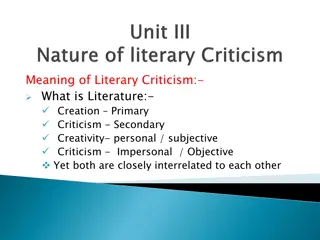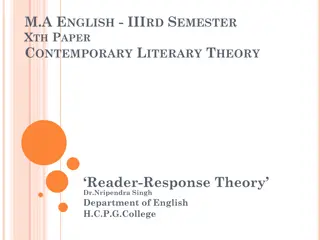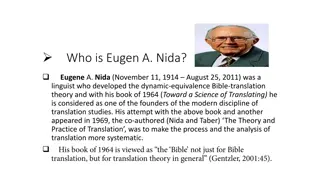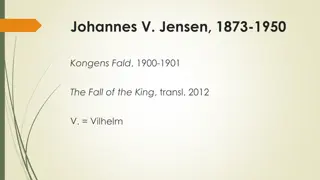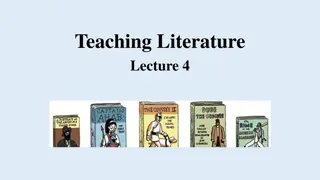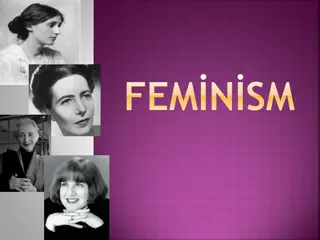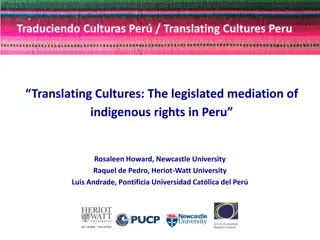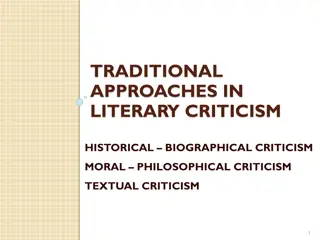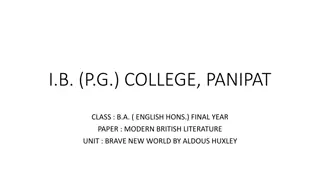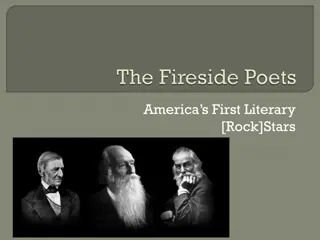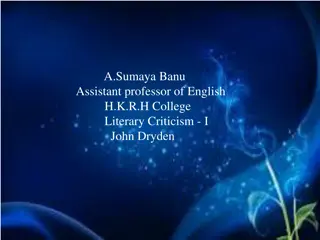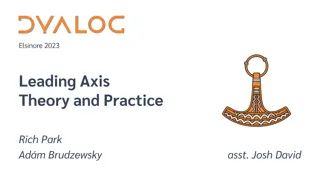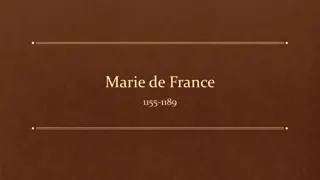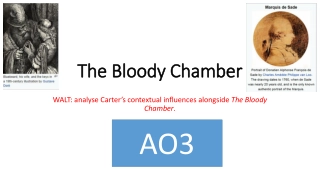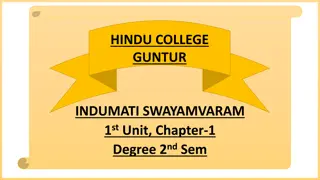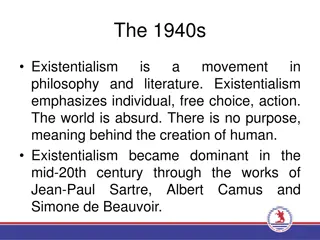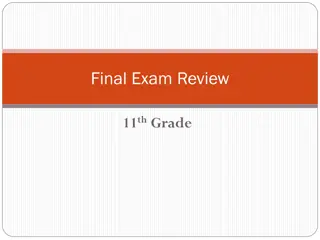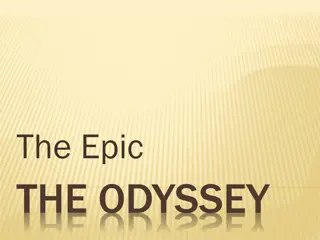The Challenges of Translating Literary Works: Theory and Practice
Exploring the complexities of translating literary pieces from various languages, this content delves into the nuances of preserving the essence of words and meanings across cultures. It highlights the intricate balance between untranslatable nuances and the necessity of conveying the essence of a text through translation.
Uploaded on Sep 23, 2024 | 0 Views
Download Presentation

Please find below an Image/Link to download the presentation.
The content on the website is provided AS IS for your information and personal use only. It may not be sold, licensed, or shared on other websites without obtaining consent from the author. Download presentation by click this link. If you encounter any issues during the download, it is possible that the publisher has removed the file from their server.
E N D
Presentation Transcript
B ri n gi n g Jo se ph H o m e : T he o ry an d Pragm ati cs o f a T ran slate d G hazal fro m H afe z-e S hi razi George Lang / georgelang3@me.com
Beautiful words are untrue, true words are not beautiful (Laozi) To read a poem in translation is to pledge troth to a ghost, a wispy, intangible presence residing in another world you can never touch without crossing over to it (GL -- https://alteritas.net/pastis/translations/) The challenge of Comp Lit is to balance the singularity of untranslatable alterity against the need to translate quand m me [despite ourselves] (Apter).
Literary works are purely intentional objects objects owing their existence and essence to consciousness (Ingarden)
For the Russian formalists a literary work was not studied in isolation but as part of a literary system (Munday 170). Persian and Urdu engaged "with the tazkirah tradition, inclusion of extraliterary national figures alongside poets, use of a shared set of references and sources, and new sexual aesthetics that break with the homoerotic Persianate past (Jabbari 2018; 418).
yusef-e gomgashteh b z yad beh kan' n gham makhur kolbe-ye ahz n shavad ruzi golest n gham makhur Scansion (Ramal mahz f) according to Thackston yu su fe gom | gash teh b z | yad beh kan ' n | gham ma khur | | | "Alliterative structuring" Radif: / gham makhur yusef > Quran 24 / Genesis Salm n (1300-1376) which reflects the Quranic hut of sorrow Joseph's father built in Canaan where he retired to weep for his beloved son kolbe-ye ahz n > a set phrase, occurring also in a ghazal of golest n > a stand of flowers, and the title of Hafez's and others collections of ghazals
Grieve not! Joseph gone astray ` | ` | `| | ` | | ` will find his way to Canaan. | ` | | ` | | ` | Grieve not! From the cell where ` | ` | ` | | ` | sorrows dwell will spring a stand of flowers. ` | | ` | | ` | | ` | | ` | * Spondees ( ` ` ) and iambs ( ` ) End slant rhymes / internal assonance / consonance cell (= kolbe-ye ahz n / hut of sorrow) has in the contemporary context a political reference, e.g. to Ervin stand of flowers < golest n Joseph : Canaan :: sorrows : flowers the end of the poem tells us that Canaan = the Ka'aba Extract as epitaph
Robert Blys Do Not Sink into Sadness (< The Angels Knocking at the Tavern Door ) Joseph the lost will return, Jacob should not Sink into sadness; those who sit in the Grief House will eventually sit in the Garden. Bly allows himself a tercet for every couplet Much glossing of information The use of capitals emphasizes the allegorical (mystic?) nature of the poem Probably the most read and appreciated by general readers of English
Ordoubdians Fifty-Nine (< The Poems of Hafez) Do not grieve: Joseph, lost, he returns to Canaan; the hut of sorrow turns to a rose garden do not grieve Ordoubadian translates literally if not word for word, adopts a free verse structure No alliteration except the radif, the refrain Targets a readership likely to be interested in Sufism
Wilberforce Clarkes Thorns and Roses (< Hafez. Dance of Life) Forsaken Joseph To Canaan will return. Despair not. Upon the thorny stalks of family grief A rose shall bloom. Despair not. Clarke adopts a free verse structure with a tendency towards iambic in passages he glosses implicit info into the text (upon the thorny stalks of family grief)
Michael Boylans Thorns and Roses (< Hafez. Dance of Life) Back to Can an, lost Yusef cometh suffer not grief: One day, the sorrowful cell becometh the rose-garden suffer not grief. Boylan archaicizes ( cometh ) emphasizing the or at least a certain literariness of the text Sorrowful cell .. suffer and Back becometh are alliterative
yusef-e gomgashteh b z yad beh kan' n gham makhur kolbe-ye ahz n shavad ruzi golest n gham makhur Grieve not! Joseph gone astray will find his way to Canaan. Grieve not! From the cell where sorrows dwell will spring a stand of flowers. Full text of translation: https://alteritas.net/GXL/?p=4198 13



